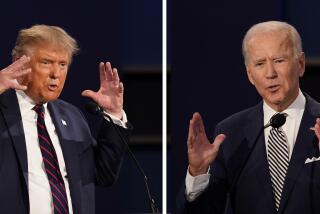Clinton Hosts Debate of Russia Candidates
- Share via
MOSCOW — In an unusual foray into a foreign election campaign, President Clinton played host to an impassioned but civil debate Sunday among 12 Russian politicians on the question facing voters here: Should Russia stay the course of reform or retreat to communism?
For 90 minutes, Clinton sat and mostly listened while others--including Communist leader Gennady A. Zyuganov, two other opposition presidential candidates and backers of President Boris N. Yeltsin--sparred face to face around an oval table.
The private encounter, described by one U.S. official as “very vigorous and enlightening,” allowed Clinton to avoid criticism that his three-day visit to Russia was designed to boost Yeltsin’s underdog campaign for reelection June 16.
It also gave the U.S. leader his closest look at Zyuganov, the former schoolteacher and Communist propaganda chief who tops Yeltsin in every opinion poll and might end up sitting alone with Clinton, at a summit of two presidents, the next time they meet.
The image that the ruddy 51-year-old Communist projected Sunday was what another participant called “Zyuganov for export,” a gentler model of the nationalist who wrote in a book that Russia is a “bleeding hulk” wounded by “the attempt to transport Western capitalism onto its soil.”
When it was his turn to speak, Zyuganov said later, he told Clinton that “Russia and the United States must have long-term good-neighborly relations,” and he voiced support for private property, freedom of the press and multi-party democracy.
But he insisted on the need for a return to stronger state control over the economy to revive industries that collapsed under free-market reforms and protect laid-off workers and retired people whose pensions have been diminished by free prices.
Clinton did not challenge Zyuganov’s ideas or his moderate portrayal of himself. But others at the table did, including Anatoly B. Chubais, the architect of Yeltsin’s massive sell-off of state property.
“Zyuganov talked about his support for private property. . . . I reminded President Clinton that Zyuganov had signed the Communist Party program, which says just the opposite,” Chubais said. “I don’t think that Clinton could fail to see the difference between what Zyuganov tells the West and what he tells the Russian people.”
*
Nevertheless, Clinton left the debate relieved “that there was some consensus that no one would long for a return to the Cold War,” a senior administration official said.
Even if that’s true, Clinton could face a much wider range of difficulties with a Zyuganov administration than he does with the increasingly nationalist Yeltsin. In any case, the senior official said, “The president made the obvious point that we will base our policies on our interests . . . and that when the views coincide, we will be able to work together.”
U.S. Ambassador Thomas B. Pickering, who arranged the debate at his Spaso House residence here, invited two other Communists. But except for the other presidential candidates--liberal economist Grigory A. Yavlinsky and retired Gen. Alexander I. Lebed--the other guests were pro-Yeltsin and kept Zyuganov on the defensive.
Moscow Mayor Yuri M. Luzhkov framed the debate from the outset by insisting that “we can’t go back to the past, because we know how bad the past was.”
“The most heated issue was whether to move forward or backward,” Zyuganov said later. “We [Communists] were trying to prove that there is no way to move backward, that we can only advance.”
Another attack on the Communists came from Boris Y. Nemtsov, one of four regional governors in the room. After telling Clinton that he too had been elected to the governorship at age 32, Nemtsov extolled the benefits of reform in his region that helped him win reelection in a landslide last year.
“Our presidential elections will be nothing like the ones in the United States,” Nemtsov said. “Our entire system may change as a result.”
*
The mood in the room lightened when the young governor predicted that Clinton will win reelection in November “because your opponent, Robert Dole, looks a lot like [Leonid] Brezhnev,” the late, heavy-browed Soviet ruler.
“Careful what you say,” Clinton was heard to reply. “Zyuganov may endorse him.”
Zyuganov joined in the laughter.
Clinton had met with Yeltsin’s opponents after two previous summits here, but his arrival in the heat of the presidential campaign made Sunday’s meeting more sensitive.
Asked whether he approved of Clinton’s planned meeting with his rival, Yeltsin quipped: “Only if Zyuganov has some company and not [if they meet] one on one in a small room whispering something into each other’s ears.”
The format allowed Clinton to hear out Zyuganov without so much as a handshake or even the briefest private exchange. And the U.S. leader seemed to relish the role of a moderator who could bring together such a diverse group.
“Clinton just asked, ‘What is the sociopolitical situation in Russia?’ ” said Eduard E. Rossel, another regional governor. “After that he just listened.”
In earlier remarks, Zyuganov accused Clinton and other Western leaders of bias for staging a summit of the Group of 7 industrial democracies here to help Yeltsin look more statesmanlike.
But other politicians say foreign policy won’t weigh much on Russian voters’ minds. And pollster Grigory Pashkov said Clinton’s meeting with the other politicians Sunday “can only add to the legitimacy of the opposition.”
One leading presidential hopeful, Vladimir V. Zhirinovsky, was not invited to Sunday’s talks because U.S. officials consider his ultranationalist views “beyond the pale.” Zhirinovsky reacted Friday by urging parliament to remain in session “as long as the seven crooks stay in the country.”
More to Read
Get the L.A. Times Politics newsletter
Deeply reported insights into legislation, politics and policy from Sacramento, Washington and beyond. In your inbox twice per week.
You may occasionally receive promotional content from the Los Angeles Times.










